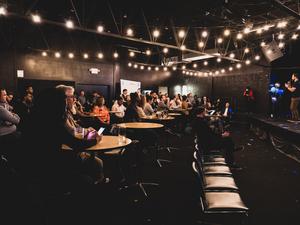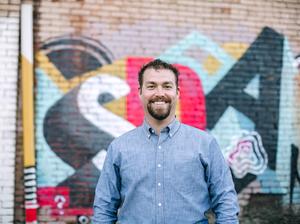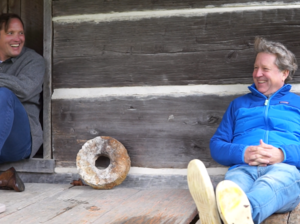
In New York, no one knows that Gill Holland does anything but film.
In Louisville, we've branded him as a developer, largely for his work in the city's NuLu and Portland neighborhoods. In fact, he's got a new hotel project in the works that was announced just last month.
But in reality, Holland is the wearer of many hats — producer, investor, co-founder, managing partner, filmmaker — and he sees similarities between the sectors he works in, he told the audience during a session at Louisville Startup Week on Tuesday evening.
"A movie really is just another startup," he said. "The only difference is at a startup, you're trying to solve a problem, right? Like a new way to innovate or you see market potential for something. Films are just a story."
Films, like startups, are all about pitching ideas, building the right teams and working with shoestring budgets, Holland said.
The first film Holland produced, "Hurricane Streets," written and directed by Morgan Freeman — no, not that Morgan Freeman — got its start with a $22,000 budget created with maxed-out credit cards and Super 8 cameras. He later got another $200,000 in funding by adding another producer, extending the shoot to three weeks instead of just two and enabling them to shoot on 35-millimeter film.
After "Hurricane Streets" won Audience, Best Director and Best Cinematography Awards at the 1997 Sundance Film Festival, Holland and his team sold the film to MGM for $1.8 million. That was a pretty good return in just about a year.
He went on to sell the next film he produced, an LGBTQ-focused documentary called "Dear Jesse," to HBO and it was later nominated for an Emmy Award.
Following those early successes, Holland said he appreciates when prospective filmmakers and entrepreneurs have done their homework before pitching a script or a business.
He's invested in Forecastr and Cornbread Hemp, both Louisville-based startups, among others.
"I invest in a lot of startups, and I'm always amazed that people come in having done no research ... They just know I'm a potential investor. They don't know what I've worked on — it's like why did you take the meeting?" Holland said. "There are so many things that I could be involved with and spend my time on ... If I'm involved, I'm going to be value-add. I'm not just writing checks for a return."
Aside from fundraising for film or development projects, Holland also talked about his experience fundraising for Harlan County Beer Co., a brewery in Harlan County, Kentucky. Founded by Holland and Geoff Marietta, it raised about $240,000 through its Wefunder campaign, with another Louisville developer, Andy Blieden, as the lead investor.
Wefunder had told Holland typically, 30% to 40% of the crowdfunding campaign comes from Wefunder investors. But for Harlan County Beer Co., it was less than 5%.
"It was all our friends [who invested]," Holland said. "We're not selling beer — we're selling community, neighborhood revitalization and Appalachian tourism. And we're going to have free wifi. Right now, people in Harlan are sitting outside in the McDonalds parking lot to get free wifi."
With all of the other projects he's got in progress, Holland is still making movies. In fact, he was in New York earlier in the week, hearing 15 to 20 script pitches in just five hours.
"I tell people all the time in meetings, 'I'm not a developer,'" he said. "I'm a filmmaker that's trying to get some buildings done and filled up."
Louisville Startup Week continues through Thursday. You can find more information and tickets here.










